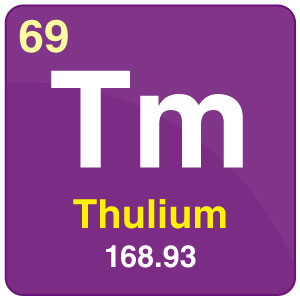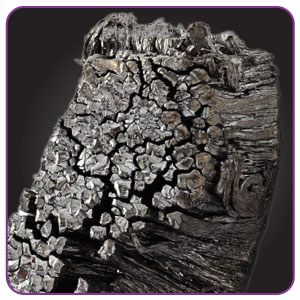Thulium

| Symbol | Tm |
| Atomic Number | 69 |
| Atomic Mass | 168.93 g.mol -1 |
| Discovered by | Per Theodor Cleve in 1879 |

Table of Contents
- Chemical Properties of Thulium
- What is Thulium?
- Uses of Thulium
- Properties of Thulium
- Certain Facts About Thulium
Chemical Properties of Thulium
| Group | Lanthanides | Melting point | 1545°C, 2813°F, 1818 K |
| Period | 6 | Boiling point | 1950°C, 3542°F, 2223 K |
| Block | f | Density (g cm−3) | 9.32 |
| Atomic number | 69 | Relative atomic mass | 168.934 |
| State at 20°C | Solid | Key isotopes | 169Tm |
| Electron configuration | [Xe] 4f136s2 |
What is Thulium?
- Thulium is a chemical element having an atomic number 69 with the symbol Tm, discovered by Theodor Cleve in the year 1879.
- It is the thirteenth element in the lanthanide series in the periodic table.
- The element is barely traced purely in nature, but it is traced in minute amounts in minerals with other rare earth metals.
Uses of Thulium
- It is used for laser manufacturing and for surgical purposes.
- Thulium is used as a source of radiation from portable X-ray devices and in nuclear reactions.
- Despite being slightly expensive, superconductors of high-temperature use thulium.
- It is used for manufacturing ferrites and ceramic magnetic materials for microwave items.
Properties of Thulium
- The element is the second least abundant element in the lanthanide series.
- It would tarnish once exposed to air due to its malleability and ductility.
- The element contains one natural isotope, 169Tm, which has a half-life of 1.92 years.
- The remaining isotopes of the element have a half-life that ranges from 2 minutes to 64 hours.
Certain Facts About Thulium
- Natural thulium in ceramic magnetic materials is used in microwave equipment and is useful for doping fibre lasers.
- Once used for bombarding in a nuclear reactor, thulium could be employed as a radiation source in portable X-ray equipment.
- Unlike the other lanthanides, thulium has a low-to-moderate acute toxic rating.

Comments